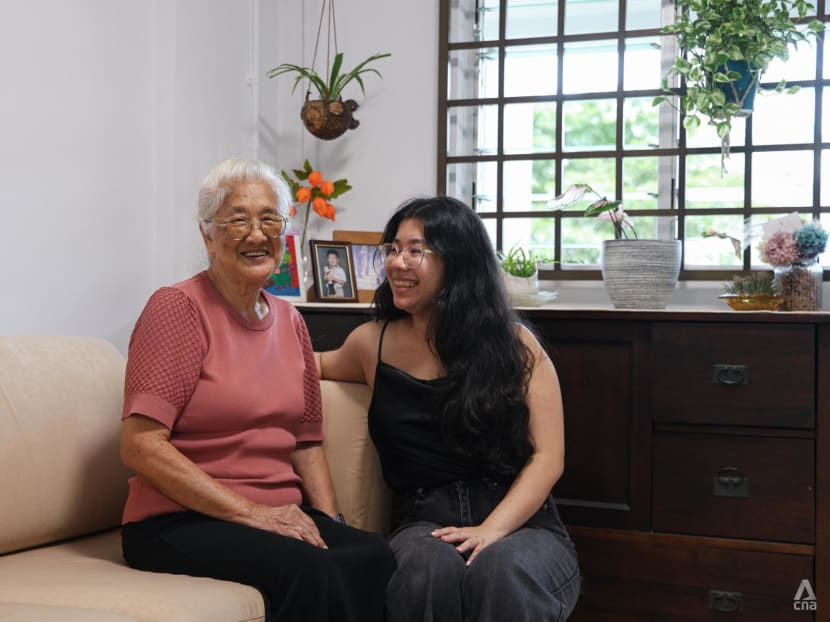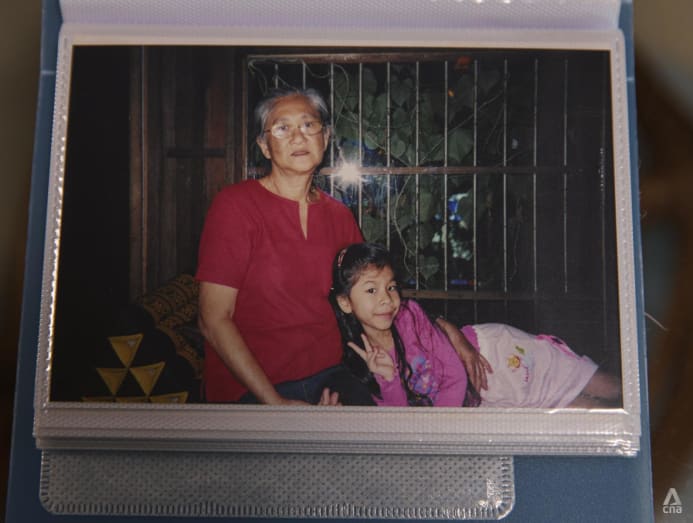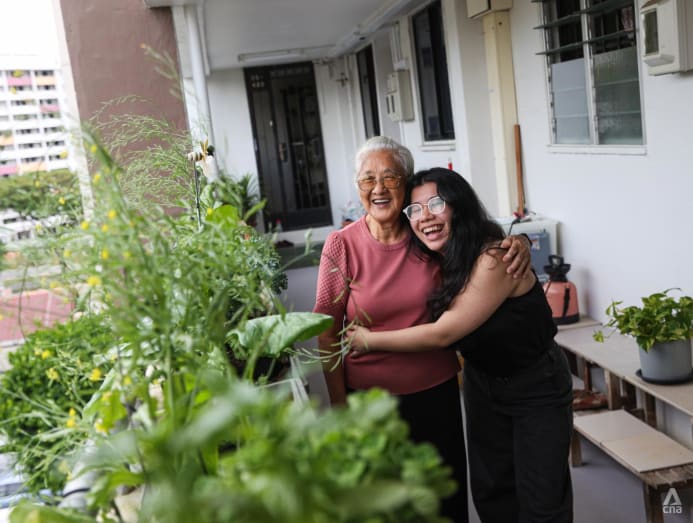Losing my Teochew skills has eroded my relationship with my grandma. I’m trying to fix it, but it’s not easy
As a child, CNA TODAY's Loraine Lee was fluent in Teochew, but she can barely form a sentence in the Chinese dialect now. She talks about how she is trying to regain the language skills in her adulthood.

CNA TODAY's journalist Loraine Lee pictured with her grandmother Lee Siew Ching. (Photo: CNA/Nuria Ling)

This audio is generated by an AI tool.
During a meet-the-teachers session in primary school, my Chinese teacher told my mother: “You need to stop speaking Teochew at home and start speaking more Chinese.”
At nine years old, I was fluent in Teochew, having picked it up from my grandparents who took care of me. We spoke little Chinese at home and it showed in my Mother Tongue grades.
In response to my teacher’s concerns, I was swiftly enrolled in weekly Chinese tuition classes for the next seven years. At the O-Levels, I miraculously passed the subject with a C6 grade.
Growing up, I never thought much about my ability to speak Teochew.
I hadn’t set out to learn it nor had I been formally taught. I had picked it up entirely through osmosis – my Teochew grandmother, who is illiterate and communicates only through the dialect, was my primary caretaker, looking after me every single day while my parents were at work.
I would translate menus for her when we went out to eat, explain the plots of television shows and try my best to keep her up to date with the news.
As I got older and she started living alone, she would call me to ask about my day before talking about the vegetables she grew outside her flat.
And then life took over.
I graduated from school and started working, and that began to take up more of my time. Soon, I found myself unable to even answer her phone calls some days, tied up with rushing assignments and deadlines.
Before I quite knew it, I went from speaking my dialect daily to speaking it, at best, once a month.

LOSING TOUCH
My 88-year-old grandma always starts our conversations with “Jiak ba buey?” – a simple, affectionate phrase to ask if I have eaten. It’s a sort of shorthand for how elders express their love and concern.
However, over the last few years, this simple question seems to be getting harder for me to answer.
I still know how to say, “Yes, I’ve eaten”, but beyond that, I find myself flailing and floundering to describe my meals or what I did after eating.
Years of barely speaking Teochew has eroded my fluency.
As time went by, a barrier seemed to be emerging between me and my grandmother, one moment of incomprehension at a time.
Our calls got shorter and our conversations were increasingly replaced by awkward laughs as she could not understand my broken sentences that were full of faulty pronunciations and English phrases.
During family visits and gatherings, I could see her facial features draw together in confusion before she would turn to my parents or the nearest aunt or uncle for translation help.
If they were busy, the conversation would rapidly taper off and we would sit there together in awkward silence.
DIALECTS AND HERITAGE
The 2020 population census in Singapore showed that there are more than half a million Teochew people here.
Yet, the same census found that a mere 59,242 residents had Teochew as their most spoken or second-most spoken language at home.
Just 125,507 residents spoke English and a Chinese dialect at home.
Among those in my age group of 25 to 29, just 321 listed Teochew as either their most spoken or second-most spoken language at home.
Linguists have told CNA that the dwindling use of dialects is due to the government's Speak Mandarin Campaign rolled out in 1979. It aimed to make Mandarin the unifying mother tongue of all Singaporean Chinese for “pragmatic” economic reasons, among other things.
The truth is, as incredibly difficult as it is to learn to speak any dialect fluently in this day and age, it’s even more difficult to maintain any acquired fluency.
Classes are held by various clan associations and language centres, but finding someone in Singapore to converse with on a regular basis is difficult.
And as my Teochew-speaking ability fades, I’m losing touch not just with my grandmother, but my heritage and culture.
For instance, the significance of eating pek tor he, or rabbit fish, during Chinese New Year for prosperity would have been lost on me if my grandmother had not explained it to me.
Her recipes for kong bak bao (braised pork belly bun) and other homemade delights may soon be lost as well. After all, she is unable to write down the recipes. We can only learn by listening to her listing down the ingredients and describing the cooking method.

MAKING AN EFFORT
In the past few months, my grandmother has been trying to communicate with me, my sister and cousins without relying on Teochew.
Despite never attending school in her adolescent years – never even using a pen or pencil – she has been taking ad-hoc Chinese and English classes held by the community centre and eldercare organisations in her neighbourhood.
There may have been some hiccups – trying to say “duck” and instead letting a curse word fly – but the efforts she is putting in, driven by love for her grandchildren, has been equal parts endearing and heartbreaking.
She is trying to catch up with her grandkids, but shouldn’t we, as the future generation, be putting in the effort as well to communicate with our elders closer to their linguistic comfort zones?
Whenever anyone tells me that being able to say a few phrases in a dialect is “already very good for your generation”, I do feel proud of being able to speak Teochew.
Yet, a part of me mourns the fact that so few of my generational peers can converse in their "grandmother tongue" such that even my broken Teochew is worth commending.
In conversations with friends, several of them find little purpose in learning dialect – or relearning it, if they’re in the same boat as me.
For many, it’s hard to know where to begin if their grandparents are no longer around.
Others find it a hassle, because when they already struggle with Mandarin, why would they want to take up yet another language?
BRINGING BACK DIALECTS FOR A NEW GENERATION
As much as I try not to think about the inevitable, I can’t ignore reality. I know my ability to speak my dialect will keep fading as fewer people around me speak it.
In another 10 to 20 years, when most of my grandmother’s generation have left this planet, perhaps my Teochew skills will have dissipated entirely.
Having no time to commit to formal classes, I’ve started trying other ways to brush up on my dialect skills in the midst of my busy schedule.
I tried listening to Teochew music, but despite my valiant efforts, listening to songs about frying flat noodles (char kway teow) and sitting on cool ground is really not to my liking.
Lately, I’ve been tuning in to online resources such as Learn Teochew to hone my skills as and when I can.
For instance, I’ve recently been refreshing myself on the intricate pronunciation differences between common words such as that of “five” ("ngou") and “two” ("no”).
I do hope other young Singaporeans will consider getting back in touch with their families' dialects, even if it’s just to remind themselves of their culture and heritage, or even learn something new about their forefathers’ values and way of life.
In addition to clan associations for different Chinese sub-groups, perhaps more informal social groups with no or minimal membership fees could attract more of the Chinese Singaporean youth to reconnect with their roots as well.
Such clubs may also consider being more flexible with the timing and type of activities to attract and accommodate a younger, busier generation. For instance, I’d be excited to join a board games group where participants aim to communicate only in a dialect.
For now, though, this is me mourning the slow death of dialects in Singapore, beginning with myself.
Loraine Lee is a journalist at CNA TODAY.
If you have an experience to share or know someone who wishes to contribute to this series, write to voices [at] mediacorp.com.sg (voices[at]mediacorp[dot]com[dot]sg) with your full name, address and phone number.













